How gas explodes in an apartment: causes of explosions and tips for safe use of gas
Have you noticed how resonant the news of the gas explosion in residential buildings is? And you wondered why this is happening? The answer is simple - not only residents of gasified buildings may be at risk, but also those who do not use this type of fuel at all. Therefore, after the gas explodes in the apartment, everyone wants to know the reason.
Tracking tragic stories, people replenish the stock of knowledge about the causes of the leak, operating rules, and possible violations. The legislation describes in detail the requirements for gas pipelines, equipment and use cases. But rarely does anyone look into legislative acts in order to correctly install a stove or cylinder, to perform installation or transfer of pipes. And specialized services are not able to track all the actions of residents.
In order to get a complete picture of the causes of domestic explosions, their scope and consequences, we have analyzed incidents accounted for by statistics. The following article contains a list of sources of danger, as well as expert advice on correcting defects, even if the hazardous equipment belongs to outsiders.
The content of the article:
The main causes of a gas explosion
To understand why ordinary household gas can explode, it is enough to turn to gas service summaries. The "honorable" first place in prevalence is occupied by the illiterate storage of propane cylinders.
Leaking old containers for years lie on mezzanines, in closets, kitchen niches under the window. For the explosion of accumulated fuel, one small spark is enough.
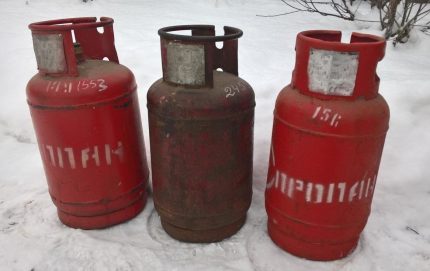
In second place are errors associated with careless installation of equipment - dropping cylinders or heating them with nearby heating devices quite often causes detonation.
The third is a malfunction gas mainleaks due to installation errors: leaks, hose wear, incorrect connection plates. This also includes unauthorized changes to the project, which exclude efficient ventilation, independent connections of additional equipment.
The fourth place is given to the carelessness of users who allow liquid injectors to fill plate nozzles. Once on the nozzle, the water extinguishes the fire, but does not block the gas outlet. The accumulation of explosives in the absence of ventilation quickly reaches critical values.
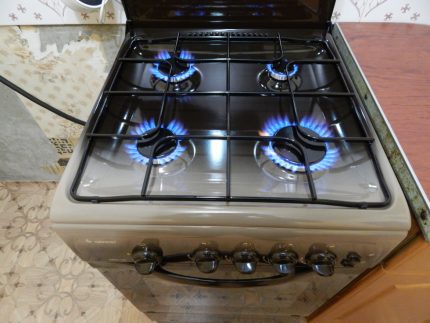
And the last, fifth place for many years holds the irresponsibility of the owners of old cylinders. Having decided to give the tank a new life, practical tenants saw, cut, in various ways open the tankto adapt to different needs. This is a blunder.
Even a seemingly completely empty cylinder always contains residual gas. Therefore, each action aimed at autopsy is a step towards disaster.
Differences in methane and propane explosion
Looking at the statistics of household gas explosions, it is easy to notice the dependence of the frequency of incidents on the type of fuel. There are more accidents due to propane than using methane.
Professional gas workers explain this by the fact that methane is used to supply fuel to the serviced highways. Networks are regularly checked, repaired, updated. The operation of equipment with propane, on the contrary, is rarely monitored and, in fact, has been placed under the responsibility of ordinary users.

The methane explosion power is almost twice as large. However, propane generates more heat - it is more efficient as fuel. Therefore, the explosion of propane cylinders is accompanied by intense combustion, and the main destructive force of methane is the blast wave.
Explosive methane concentration
The lower value of the explosive concentration of natural gas is 4.4% of the total air mass. The explosive peak is reached at a concentration of 9.5%. When the air is filled by more than 17%, methane simply burns, does not threaten an explosion, but can have a toxic effect on humans.
Accurately calculate the concentration of natural gas in the air is possible only with the help of devices - special sensors. But it’s easy to understand that a leak has already occurred when 1 percent of the air mass is filled. It is upon reaching this value that a person is able to clearly distinguish the specific smell of a substance.
Explosive Propane Concentration
A chance to organize an explosion with a propane leak appears even when 1.7% of the mixture is in the air. Explosiveness is maintained at a concentration of up to 10.9%. Like methane, propane-butane mixtures can have a detrimental effect on the nervous system. At the same time, victims complain of increasing symptoms of poisoning.

Since household balloon mixtures they are odorless, they are supplemented with odorants - strongly smelling substances. Having a very pungent odor, such substances quickly attract the attention of gas equipment owners in the event of a leak. Therefore, with due attention, it is not difficult to notice the danger in time.
Domestic gas explosion prevention
Knowing what causes gas to explode most often in apartments, you can make a list of actions to prevent accidents.
It will include:
- operation of permitted equipment that is within the expiration date;
- connection and installation performed by professionals with access;
- competent storage and installation of cylinders;
- coordination of all project changes with the gas service;
- regular inspection of the gas pipeline, connections and equipment by gas workers;
- maintaining the ventilation system in working condition;
- cooking on a gas stove with the constant presence of adult capable people;
- Use of equipment is strictly for its intended purpose.
In addition, it is important to listen to odors and monitor the tightness of the valves, cranesflange connections. At the slightest suspicion, contact the gas service supplying fuel.

Since apartment buildings make tenants dependent on each other, sometimes you have to monitor not only your own gas equipment. If the neighbors violate safety precautions, you must write a statement to the gas service.
It must specify the exact address, the reason for the appeal, the names of residents who signed the application, information about the violators, the date of fixation. The reason may be the presence of prohibited equipment, violation of the operating rules, the smell of gas.
Explosion Proof Procedure
An incorrectly opened or dropped cylinder will leave no choice - the substance will detonate instantly. And when a leak is detected, there is almost always time to neutralize the gas. A leak can be detected in four ways: by means of gas analyzers, by soaping joints, with the appearance of a smell, and the sensation of outgoing cold from the joints.
In all cases it is necessary:
- Organize intensive ventilation.
- Close the gas valve.
- Remove people and animals from the premises, warn neighbors.
- Contact the emergency department of the gas service.
It’s better to call rescuers when you go outside. Before the arrival of specialists, it is advisable to monitor the entrance to the house so that no one can get into the gassed apartments.

The main thing, if a leak is detected, is to leave the room quickly and without panic. Therefore, if there are difficulties with finding cranes or opening windows, it is better to leave everything as it is and go outside.
If the explosion has already occurred
The algorithm for the explosion is identical. If possible, shut off the valves and leave the room. When calling, you should indicate the fact of the explosion, seek help from doctors, firefighters and gas workers. You can make a call on a single phone number 112.
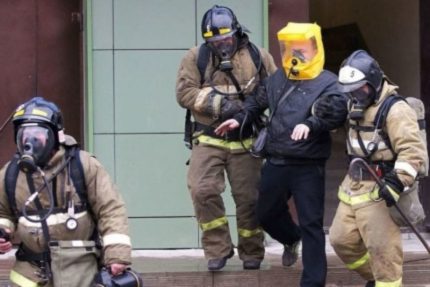
In 90 percent of cases, a gas explosion is accompanied by a fire. Therefore, the actions in such an accident are identical to rescue from the fire.
To do this, you must:
- Press a damp cloth over your face, breathe only through it.
- Determine the way to the exit. If he is blocked by local fires, try to neutralize them by throwing a blanket over his hearth and dense outer clothing.
- If there is no way to exit through the main entrance, you should evaluate the chances of leaving the room through the windows.
In some situations, it is wiser to wait for rescuers than to evacuate yourself. Therefore, it is important to correctly assess the risks, not to panic.
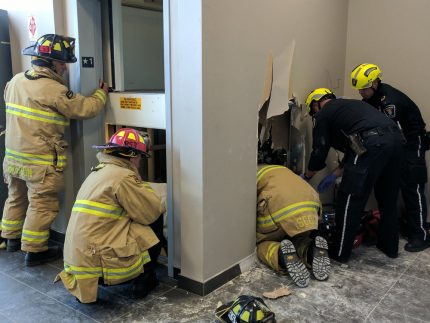
After leaving the house, rescuers advise moving away from the building as far as possible, staying at a safe distance until all sources of danger have been eliminated. Residents are notified of this by emergency personnel.
Conclusions and useful video on the topic
In the video, the specialist once again lists the main causes of accidents, mentions the need for constant monitoring of the gas pipeline, shows samples of automatic gas analyzers:
Can a propane tank explode? Yes! Can natural gas explode in an apartment? Yes. Any fuel is a source of danger. Therefore, it is mandatory to comply with all the rules and norms of storage, installation and operation of gas equipment.
If you have useful information, you want to share your experience or warn other users, write. Below is a form where everyone can ask exciting questions, post a comment or photo. Participate in discussions, express your competent opinion.

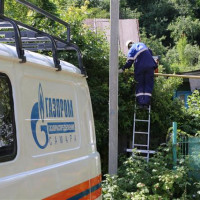 Where to call if there is no gas in the apartment: reasons for disconnection + procedure for the absence of gas
Where to call if there is no gas in the apartment: reasons for disconnection + procedure for the absence of gas 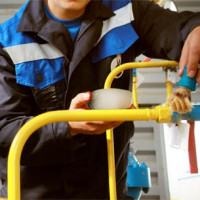 Gas leak: where to call, what can and cannot be done if the apartment smells of gas
Gas leak: where to call, what can and cannot be done if the apartment smells of gas 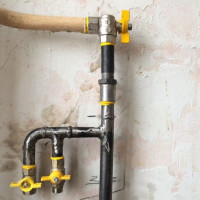 Why does the gas pipe in the apartment vibrate and buzz: causes of noise and solutions to the problem
Why does the gas pipe in the apartment vibrate and buzz: causes of noise and solutions to the problem 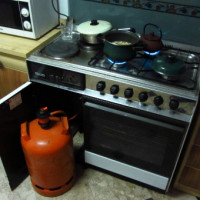 Is it possible to keep a gas cylinder in an apartment: rules and regulations for the use of balloon gas
Is it possible to keep a gas cylinder in an apartment: rules and regulations for the use of balloon gas 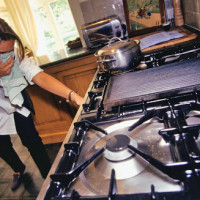 What to do if a gas stove passes gas: causes of gas leakage and their elimination
What to do if a gas stove passes gas: causes of gas leakage and their elimination 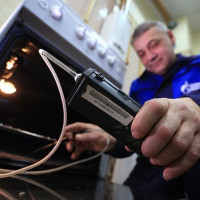 Gas inspection in an apartment: how and how many times gas equipment inspections should be carried out
Gas inspection in an apartment: how and how many times gas equipment inspections should be carried out 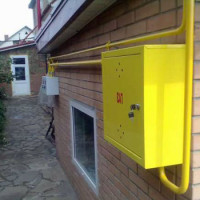 How much does it cost to connect gas to a private house: the price of organizing gas supply
How much does it cost to connect gas to a private house: the price of organizing gas supply  The best washing machines with dryer: model rating and customer tips
The best washing machines with dryer: model rating and customer tips  What is the color temperature of light and the nuances of choosing the temperature of the lamps to suit your needs
What is the color temperature of light and the nuances of choosing the temperature of the lamps to suit your needs 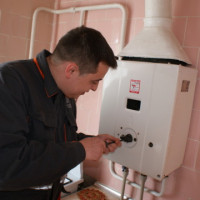 Replacement of a geyser in an apartment: replacement paperwork + basic norms and requirements
Replacement of a geyser in an apartment: replacement paperwork + basic norms and requirements
All this is very scary. And for me it is surprising - can a leak from a small balloon from the mezzanine cause a big explosion that could destroy the wall of the house?
Hello. For an explosive mixture, 3 components are needed - gas, oxygen, flame / spark source. For an explosion, the gas concentration should be 5-15% of the volume of the room for natural gas and 1.5-9.5% for liquefied.
If on a slow fire, when the stove is heated, the fire jumps to the nozzle, as a result, the burner burns and the nozzle under the burner (while the stove hisses a little) is it dangerous?
Main gas, stove in the apartment.